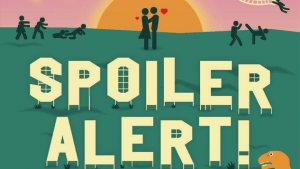Posts by Sharon Bially
My love for writing is inseparable from a love of silence: the peaceful silence of words on a page with no other distractions. Nothing else vying for my attention, pounding in my ears, calling me out of my thoughts and my imagination.
So it was hard enough for me as a book publicist when social media, with its links to videos and all other manner of noise, emerged as a way for authors to share their work. Yet in those early days, there was still space among the links for posting only words, and people still had bandwidth for reading them.
Then came Instagram. Suddenly, all that mattered—all that people wanted to share and to see—were photos. As Instagram rose to become the “it” social media platform for authors, it paradoxically began the transformation from a place for sharing snapshots and hashtags to the place for showing mainly…videos. Gone was the silence. Soon the written word was replaced almost entirely by 60-second snippets of Instastory chatter alongside 15 minutes of pontification or laughter on IGTV.
Back in Instagram’s early years, my advice to authors asking which platforms to focus on when building an audience was: skip it. Generally, memoirs, novels and the types of business and nonfiction books my agency works with don’t lend themselves to more than a few photos: photos of the cover, of readings and events, of readers holding the book. This gets stale pretty quickly. Exceptions include cookbooks or books about topics like home decor that are built around visuals.
Read MoreWhen she was in her twenties, Amy Neswald—whose debut story collection I Know You Love Me Too (October 2021) won the New American Fiction Prize—intentionally squelched her strong urge to write so she could try her luck at acting. Following her first gig building sets and building props with The San Francisco Mime Troupe, her creative journey took her from beauty school to Broadway, where she worked as wig master including for the legendary show Jersey Boys, and from screenplay writing to filmmaking. But destiny kept nudging her gently back to writing. In the early aughts she won NYC Midnight’s Short Story Challenge – and with it, a scholarship to a two-year screenwriting program. In her mid-forties, she left Broadway to pursue an MFA in Creative Writing at the University of New Hampshire and then went on to teach creative writing at the University of Maine in Farmington. Her screenplay The Placeholder was awarded a Best Screenplay award at the Rhode Island Film Festival in 2008.
Fascinated by the breadth of Amy’s creative accomplishments and the way she seems to magnetically attract awards and accolades, I asked her to join me for an interview here on WU.
SB: Tell us about I Know You Love Me Too, and how it came to win the New American Fiction Prize
AN: I started working on the collection in graduate school at the University of New Hampshire. When I wrote the first story, I had no idea I’d stick with the two sisters who are its main characters, but my professor, mentor, and friend Tom Paine introduced me to Olive Kittredge by Elizabeth Strout. It was a game changer for me. I didn’t know a short story collection could tell a complete story over time about a single character and I loved it. So I wrote another story, which is no longer in the collection, where one of the main characters simply passes through, but at a pivotal time in her life. And then I was hooked. I fell in love with both sisters and everyone who surrounded them.
Winning the New American Fiction prize was completely unexpected. When I felt like I had a collection, I sent it to all the big contests and, as expected, I was rejected by all of them. My collection is not edgy; it doesn’t hit on trending issues and the questions it asks are very subtle and small, so I really didn’t expect any attention. But… you’ve got to put your work out there. I don’t know the real ‘why’ or how David Bowen and Judith Blair Mitchell chose my collection out of a pile of other quality works, but I’m so thankful that they did. I’m gobsmacked by the opportunity to have the New American Press publish my work.
SB: You’ve won several prestigious awards: The Rhode Island Film Festival’s Best Screenplay, NYC Midnight’s Short Story Challenge… It seems that each award was for one of your “firsts:” […]
Read More“My publisher told me that sales numbers the week of publication will make or break my book’s future. Let’s hurry and make sure as much news as possible goes live that week!”
“With my publication date in 3 weeks, I’d like to start PR right away to make a huge splash that day and boost my book’s chances of success.”
Nearly every day I hear comments like this from authors hoping that PR and marketing aimed at their publication date will catapult their new books to overnight success. Here’s the formula they’ve been taught:
“Get the word out ASAP = pique potential readers’ interest right away + drive sales.”
If only it were accurate.
As it turns out, reality is starkly different. Let’s unpack it.
First, getting the word out in and of itself takes time. If you have a publicist, they’ll need to develop a thoughtful strategy and messaging plan. They’ll need to build press lists and prepare marketing materials and press releases. When done well, this is a lengthy process filled with myriad gnarly details that slow things down.
Once communications do start rolling out, recipients need time to process them. Reporters, editors and reviewers get many hundreds of pitches a day sent directly to their inbox. They may not spot your pitch or press release right away. When they do finally see the news about your book (if they do!) they might not be able to focus on it for a while.
Then—if and when they do see the news about your book, and if and when they decide to follow up—lots of things need to happen before a review or interview can go live. Media contacts may need to:
Sure, there are times when things happen much more quickly. But those are rare. I’ve described this process in detail before here on Writer Unboxed.
Once the coverage is out in the world your potential readers need to see it and focus on it. That, too, takes time. At any given nanosecond, your audience, like the rest of us, are all in the midst of a thousand different things.
All of this adds up not to instant interest and sales, but to the beginning of a long, slow trek. Which is why I always say that BOOK PROMOTION IS A MARATHON, NOT A SPRINT.
In the sprint scenario, you race to do everything imaginable—PR, social media, newsletter marketing, signings, etc—over the course of a few months leading up to your publication date, then come to an abrupt halt […]
Read MoreWhen my younger son was in the first grade, his teacher gave the class a writing assignment that consisted of finishing this sentence:
“The most important thing about [insert your name] is____”
My son, Alex, wrote, “The most important thing about Alex is that he tries really hard.”
Now, eleven years later, as I read over Alex’s draft college essays, I realize that this “most important thing”—he tries really hard—was true about him then and is still true about him now. In fact, this simple sentence manages to sum up and describe so much about who Alex is, what his values are and what drives his choices and actions.
Because it invites such an apt and succinct description of a defining characteristic of the person completing the sentence, this simple first-grade assignment also contains a brilliant nugget of writerly wisdom: at the heart of every character, every scene and every story lies one single Most Important Thing. It could be a sentiment, a motivation, a mood or a source of tension. But whatever it is, there is only one that’s most important.
In drafting stories, with so many strands of inspiration swirling around in our minds, it can be hard to sort out what really matters. Which characters, which scenes, which actions, descriptions, metaphors or dialogue lines are relevant. What lies at the heart of it all and how to stay centered amid the myriad possibilities pulling us in different directions is often nebulous because everything we create and imagine feels precious.
In my own fiction-drafting process, the phrase “the most important thing about X is____” is always on my mind—especially as I re-write, revise and cut. X can be any number of things: a character as a whole, a character’s mood in a particular scene, the relationship between two or more characters, a setting, a prop, a conversation. It may take multiple drafts for that Most Important Thing to become clear, but even in early iterations, I am constantly asking myself what it is. In the early stages the answer informs me about what direction to head in, what overarching choices to make, what to include and whether to continue at all. If I can’t articulate a Most Important Thing, is there a story worth telling?
Read MoreSpoiler alert: this post is not going to talk about COVID-19 or the state of our world and the ways in which we’ve all needed to adjust. But it is going to look at the pandemic as an example of something I’m asked about all the time. You guessed it: spoilers.
Rarely does a week go by when an author does not ask me whether posting a particular snippet with plot information to Facebook, or sharing a description of their main character’s conflicts or fate with a reporter will “give away too much.” In other words, whether it’ll be a spoiler.
Every single time—regardless of the amount of detail being shared—my answer is no.
Though it might sound surprising, in the world of book promotion, more information is…more. And less is…flat. In order to engage people who have not yet picked up your book, there needs to be enough powerful, detailed information to pique their curiosity. Far too often I see authors very carefully opting to give away little more than a publication date, a cover image, the sources of their inspiration and the content of the back cover copy. But in holding back juicy detail, you’re missing opportunities to engage.
Think about it. Details in and of themselves don’t tell the story. To anybody who has not read the book, details are like bait. As the author, you know your own book intimately. You instantaneously connect the dots from each tiny detail to the bigger picture. But that’s only because you know the bigger picture. Future readers have no way to do this.
Here’s how you can artfully weave the right spoilers into shout-outs and other communications about your book:
Be specific
Share juicy details abundantly. In and of themselves, they give little away. Instead, they give a flavor for what makes the characters, the setting, the conflicts and your voice unique. These little tidbits will create intrigue and make people want to know more, not less.
For example, buried in one book we recently promoted is the author’s story of having been fired from her dream job due to sexual discrimination but deciding not to file a claim about it. (You might be wondering why. You can read about that here.) Most authors would want to hold back from sharing the details of a story like this and its outcome in the promotion process for fear that readers will get enough satisfaction from that stand-alone anecdote that they won’t want to read the entire book. But in fact, this tidbit is an intriguing inroad to the book itself, serving to pique curiosity. Doesn’t it make you want to know more?
Read MoreAfter sailing for the USA in the 2004 Olympics, Carol Newman Cronin shifted gears and became a writer, penning four novels (and counting…) with themes tied closely to the sea and coastal life. Her latest, Ferry to Cooperation Island, releases on June 16.
Like most authors this year, Carol had no idea what the whims of Mother Nature had in store as she looked ahead to her launch date. The date had been carefully planned to fall right before the now-postponed 2020 Olympics. Carol had a series of launch readings in appropriately coastal settings scheduled for the summer. And then…
But as a sailor, Carol knows a thing or two about adjusting to Mother Nature’s whims. She’s inspired on both water and land by the motto, “When you can’t change the direction of the wind, adjust your sails.” Her wisdom has far-reaching implications for all of us, whether we’re currently launching books or in the trenches with a WIP.
I’m happy to share this inspiring interview with Carol.
Q: How did you react when you realized that Coronavirus was going to profoundly change your plans to launch Ferry to Cooperation Island?
CNC: At first, there was denial: surely it will all be over by June! Once reality set in that this was going to change, well, EVERYTHING, I started to research how other authors were handling online book launches. Then I freaked out, because the possibilities are so limitless right now—and there are so many authors launching their own books into the same “space.” Fortunately, one author-friend reminded me to focus on what was really important to me and to FERRY, and let go of the rest. That was a reminder that this book isn’t going to change the world—though I like to think it will make a small dent in our global negativity.
A few weeks ago, I finally shifted all my launch-party energy from “maybe we’ll be able to meet in person” to “we’re going virtual.” The date remains the same, June 18, and you’re all invited!
Q: So far, what has changed for you? What hasn’t?
CNC: First of all, all the regattas I planned to sail have been pushed back until 2021 (just like the Olympics), so my schedule’s wide open for book signings! As far as the launch party, I was really looking forward to physically associating FERRY with my own town’s actual ferry service, which runs from Jamestown to Newport in the summer and was part of the book’s inspiration. That will have to wait until it starts running again.
The best change of all is that more people are finding or making time to read again. I chat more with neighbors walking by, and a surprising number are actually interested in reading my latest piece of #coastalfiction!
What hasn’t changed is the incredible support I’ve received all along this journey from other writers, many of whom I met at the UnConference last November.
Q: Aside from major disasters like Coronavirus, what other writing-life “storms” have you sailed through?
CNC: My early fiction writing could be compared to a series of […]
Read MoreIt’s so good to be back here on Writer Unboxed after a year’s sabbatical hunkering down and focusing solely on my work helping authors build buzz and visibility at BookSavvy PR. I’ve missed being an active part of this wonderful community (though I’ve still been stalking), and have been bursting with thoughts to share from the frontlines of promotion.
Many of those thoughts suddenly feel less relevant, though, as we all stand paralyzed with shock before the Coronavirus crisis. People across the planet are being forced to adjust in ways we never imagined, and the writing community—despite a penchant for solitude that might suggest we’re relatively “safe”—is no exception. On top of losses ranging from jobs and livelihoods to favorite writing spots in coffee shops and libraries, the cancellation of launch events has come as an especially painful blow. Gratitude to Teri for the initiative to support those whose launches are suddenly un-scheduled.
Yes, it’s an immense disappointment. And yes, it is crushing to imagine not having that well-deserved, long-anticipated celebration and the bond of community it brings. This is a huge, painful loss. But if you are also biting your nails about the impact on your book’s success, my advice from the promo trenches here is: breathe. None of this is as gloomy as it might feel. Need convincing? Here is my reasoning, based on many years on the frontlines:
You Can Reschedule – and There’s a Silver Lining
This is quickly becoming the year of cancellations—and resilience. In the spirit of resilience, the show must go on. Take steps now to reschedule your launch. Your local bookstore may be shut at the moment but you can be in touch with the owner. If they are struggling as sadly, many independent bookstores are right now, and don’t know what the future holds, make a backup plan: a library, or somebody’s home. Invite the bookstore staff and owner too. It might help boost their morale.
And in the meantime, take comfort in knowing that postoning your launch event means you can look forward to it for that much longer, can build buzz in the lead-up to it that much longer, and that you have the support of many amazing communities as Allison Hammer mentioned last week here on WU.
It’s Okay if Your Launch Event and Publication Date Don’t Align
Maybe the idea of rescheduling your launch event worries you because you’ve heard that a launch must happen around the time of publication. Don’t let it. Perhaps because traditional publishers prefer to see as much buzz and as many sales as possible around a publication date, there is a huge amount of pressure on authors to do everything in their power to create that initial bang. But trust me: the bang can happen at other times, too. Books have a long shelf life. (Pun intended) I’ve known and worked with dozens of authors who for various reasons don’t hold a launch event or even begin promotion of any sort until months after a publication date at earliest, and their books have gone on to […]
Read MoreAs your book’s publication date approaches, it’s natural to turn to the pros involved in its promotion — your in-house publicist, the independent PR firm you’ve hired, or both — and ask:
“What can I do to help?”
After all, there is so much to do! And participating in the process can bring a sense of having an iota of control over this overwhelming and frankly, often quite frightening, journey.
In truth, there are a million things you could do. But while it might make you feel good to get hands-on with this project, many things might not actually help. Reaching out to every distant friend or connection who knows somebody at a magazine or TV station to ask if they can cover your book, to cite just one example, won’t help much at all, because those efforts are not well-targeted.
There are also a number of things you should be doing no matter what, such as staying on top of your social media (Instagram in particular is becoming the new it place for book promo) and organizing a launch event. But while these are all good for your book’s visibility, they don’t directly help your publicists with their job.
So what does?
Lately my team and I have been noticing a trend that’s given us one clear ask of our authors. Fewer and fewer people in the media are actually reading the books we send them. I know, it’s disappointing. But people in the media only have so many hours in the day, just like the rest of us. And more often than not, they have a whole stack of books for review on their desk. Getting to your book might feel urgent to our team and to you, but for the reporter, it’s just another multi-hundred page reading project they need to undertake.
Read MoreWhen your book launches, you naturally have a vision of where you’d like it to go and what you’d like to see happen. Reviews, interviews, readers, sales… Maybe fame and fortune! (Truth be told, many of us do harbor this dream deep down inside.) Yet, whether this vision is clear or blurred around the edges, a part of you knows that realistically, it may not take the exact shape you hope for in the end.
If you’re taking proactive steps to promote your book, staying grounded in this reality takes on a whole new meaning. After all, setting up a plan usually starts with laying out specific goals, then writing up — and plowing through — the to-do list that will bring them to fruition. Should you decide to hire a marketing or PR pro to help, the word “realistic” can easily lose its meaning altogether. Now, there’s money on the table. You’d like it to buy you exactly what you want.
As one providing these marketing and PR services, I see what often happens next: the vision morphs into a veritable checklist of desired outcomes. Specific events to speak at, specific media outlets where coverage should happen, specific social influencers who should be convinced to send out a tweet.
How I wish it were so easy! The truth is, book PR can be as messy and unpredictable as a first draft. It’s very much an art, not a science. The process is a lot like querying agents: we make hit lists of people to contact, draft press releases and email pitches that we tailor in as much as possible to specific individuals or groups, and send them out. Despite follow-up and pavement pounding, often our efforts are greeted only with radio silence.
In working on campaigns, my wonderful team and I always have our own wish lists and hopes for each book. There may be a particular news site we see as a perfect match for a specific novel we’re promoting. Or a radio show we would love to see interview this novel’s author. But even in cases where we have a strong hunch that coverage will pan out, the odds are fairly low that it will.
But there’s a beautiful flip side to this: even as we get the silent treatment from the outlets and people on our wish list (including from people we know personally), we inevitably wind up getting interest from all sorts of other wonderful outlets we had no expectations for at all. Those interviews on MSNBC, NPR’s On Point? Those articles in Marie Claire or The Washington Post? They always come as a huge, and thrilling, surprise!
Which brings me back to control. Focusing too much time or energy on a checklist of desired outcomes can actually impede your PR or marketing pro’s efforts to do what it takes to generate wonderful surprises. If an author implores us to keep trying The Today Show, for example, we may not have the bandwidth that allows the […]
Read MoreIn the publication world, there’s a tremendous amount of focus on the publication date as THE time for publicity and promotion. I’ve seen authors throw up their hands the week after publication, when media interest is just starting to trickle in, and say, “I guess we struck out.”
As I’ve mentioned here before, book promotion and publicity take time. It can often take months for an article or review to appear. But even though it’s ideal to get promotion efforts started before the big on-sale day, the sky’s the limit as far as what can be done, and what can happen, even long after that day.
My friend and literary idol Anjali Mitter Duva is a glowing example. Her debut novel, Faint Promise of Rain, released in October of 2014. Since then, she has devoted herself tirelessly to promoting it via traditional media, social media, public speaking engagements (including the occasional dance performance related to the book’s plot) and much more. Last year, her efforts led to the fulfillment of a dream: a foreign rights deal with French publisher Editions Tallandier. The French edition, Adhira, fille de la pluie, released in France (where Anjali grew up) this past May – almost 4 years after the U.S. publication. Anjali’s deep commitment to long-term promotion played an important role in this wonderful turn of events.
What did she do? How did she do it? I’m thrilled to have Anjali join us today to talk about her incredible journey, and share a number of extremely handy and insightful tips: One of my favorites: “know that you’re in it for the long haul and make plans that are slow, steady and sustainable.”
Welcome, Anjali!
SB: From the very start, you had a clear vision of what you wanted for Faint Promise of Rain. Can you share that with us?
AMD: When I started to write Faint Promise of Rain, way back in a previous era, I already knew I was in it for the long haul. You see, I planned from the start to write a set of four related but free-standing books, all historical novels with dance and India at their center, yet all set at different times and contexts in history. FPR was to be the first. I think some of this long-term planning comes from my background as an urban planner working on infrastructure projects: very long projects with frequent cost overruns and schedule changes! This long-term vision is what set the tone and pace for my promotion efforts: slow, steady, sustainable. My idea was to build a loyal, strong readership and following, because I knew (at least, I hoped, and still do) that people who enjoyed my first book would likely enjoy my next three as well. But these are historical novels that take, for me at least, years to research and write. So my approach had to be one I could sustain–financially, logistically, energy-wise–over time. Years, if not decades. Five […]
Read MoreCraft wisdom tells us that the characters we write must be motivated by a fundamental driving need–a powerful desire, ambition or goal. Powerful enough that it could drive them to lie, cheat, commit adultery or even murder.
But what if the concept of desire and drive were a bit too simple as a guidepost in character development? As a reader, I confess I often feel that a character’s drive is such a central focus that everything else about the character rings flat. After all, there’s a lot more to each human heart and mind than motive. Padding motive with moments of emotion such as joy at a birthday celebration or grief at the loss of a loved one can feel stiff and fabricated.
A few months back, I had just finished reading a novel that left me pondering all this yet again when a nonfiction book for business leaders came across my desk. At first blush the book, Leading From Purpose, had absolutely nothing to do with fiction or characters or craft. But cross-pollination can happen in the most surprising places, and as I read I could not help thinking that I’d stumbled across the missing link between characters’ motives and what gives them depth.
The concept is simple yet profound: There is this thing called PURPOSE. We all have it. But it’s not what you think. It’s not about a desire to dedicate ourselves to an external cause like saving the planet as people often think. Rather, as the book explains, purpose is the unique gift we each bring to the world and always have. Our purpose has been leading us through our whole lives, in every aspect of our lives, and never changes. It is the solid, internal ground that each of us can stand on while the world is spinning out of control.
Read MoreIf you’ve been in a writing group, you know how valuable it is to have a community of writerly peers to debate craft with, to vent with about rejection and rejoice with over triumphs, large and small.
But what if, beyond feeling like family and supporting you through your next round of revisions, your writing group was powerful? So powerful, in fact, that the manuscripts emerging from it regularly went on to land major publishing deals and launch the type of literary careers most of us only dream of?
It may sound too good to be true. But in the Boston area, a cluster of modest, hard-working novelists formed a writing group back in 2012 that has played a key role in catapulting authors including Celeste Ng, Alexandria Marzano-Lesnevich and Grace Talusan into the literary limelight. And under the deceptively unassuming name “the Chunky Monkeys,” this writing group on steroids has just recently seen 3 of its members simultaneously achieve stunning — almost unheard of — success:





















